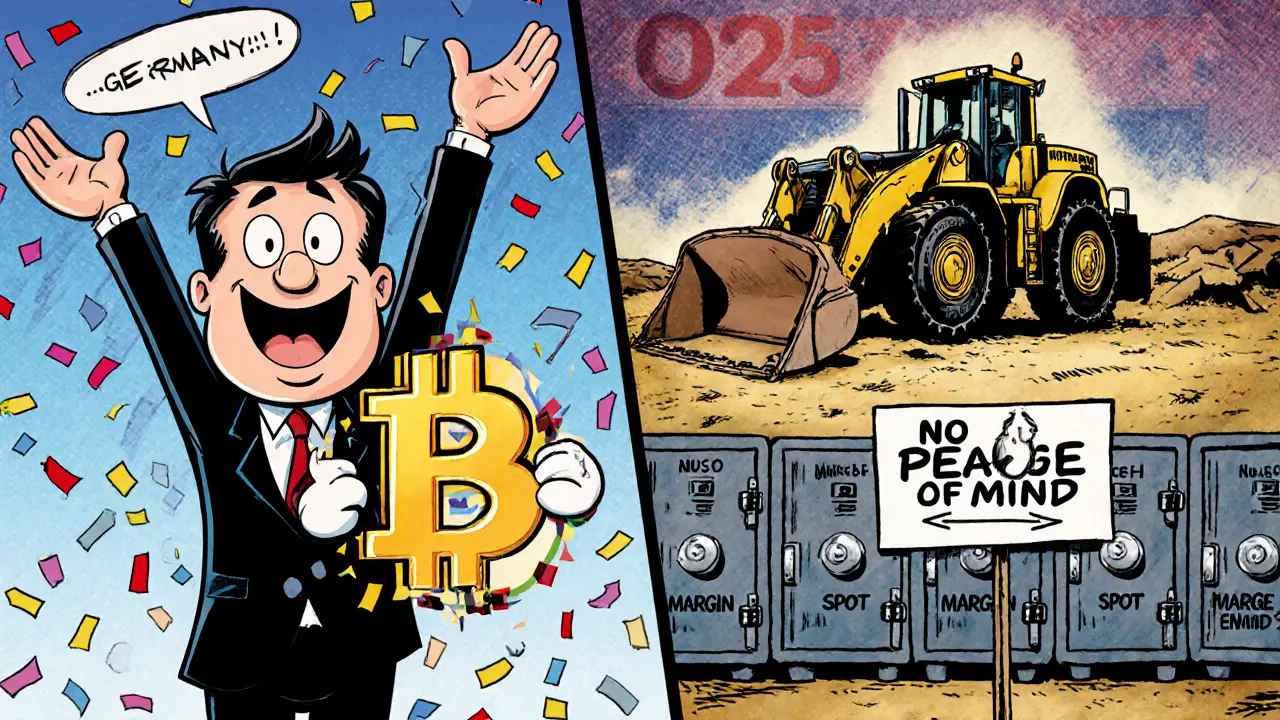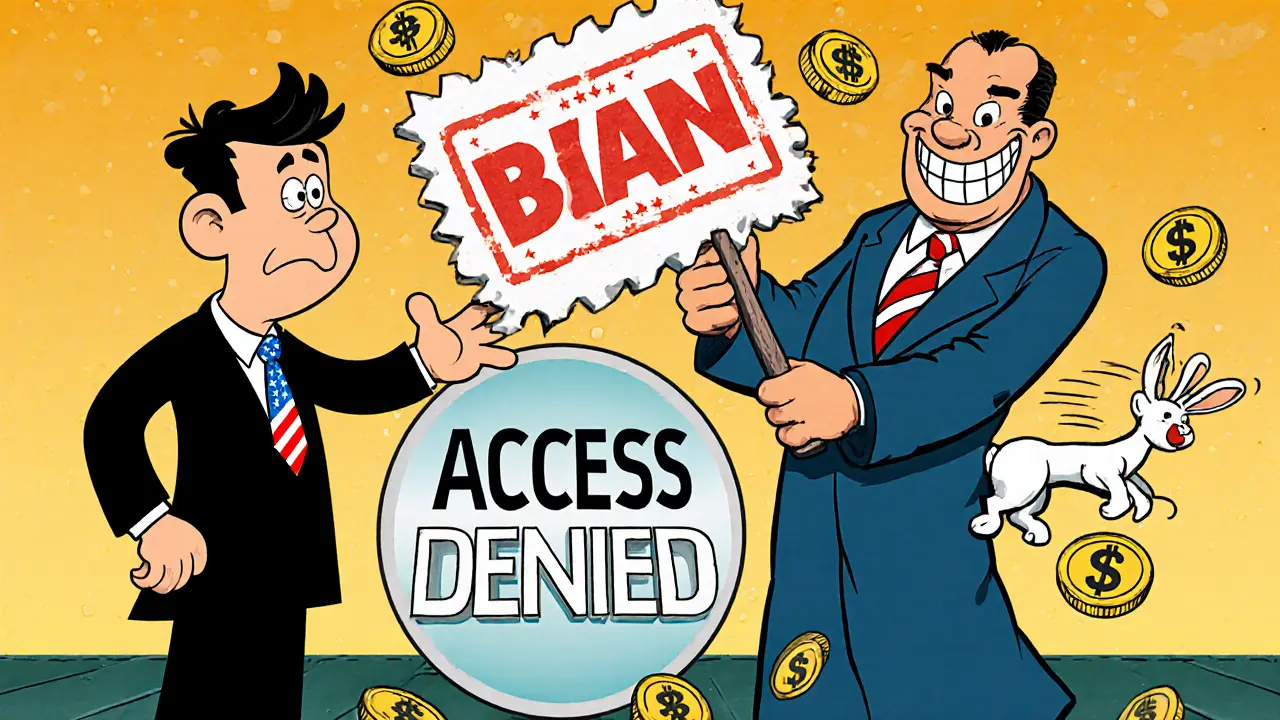OKX Country Access Checker
Check Your Country's OKX Access Level
Enter your country to see OKX's current trading restrictions as of November 2025
Trading Options
Recommended Alternatives
If you’re trying to use OKX and got blocked, you’re not alone. Thousands of users around the world hit the same wall: OKX crypto access limitations by country. It’s not a glitch. It’s not a bug. It’s compliance - and it’s complicated.
Why OKX Blocks Some Countries
OKX isn’t picking countries at random. It’s reacting to laws. The exchange is based in the Seychelles, but it operates globally. That means it has to follow rules from the U.S., EU, UK, Singapore, and dozens of other jurisdictions - even if it doesn’t have a physical office there. In 2025, OKX banned services in 18 countries outright. That includes the United States, Canada, the United Kingdom, Singapore, Malaysia, Cuba, Iran, North Korea, and Syria. Why? Because those places have strict anti-money laundering laws, sanctions, or outright crypto bans. For example, the U.S. doesn’t allow offshore exchanges to offer derivatives or futures to American residents. So OKX doesn’t even try to serve them. But it’s not that simple. Some countries are in a gray zone. Australia, Brazil, and South Korea can still use OKX for spot trading - buying and selling Bitcoin, Ethereum, and other coins - but futures and leverage trading are blocked. Why? Because those countries are tightening rules on high-risk crypto products. OKX chose to pull back on derivatives rather than risk fines or legal action.The Three Tiers of OKX Restrictions
OKX doesn’t just say “yes” or “no.” It uses three levels of access:- Level 1: Complete Ban - You can’t sign up, deposit, or trade. Countries: U.S., Canada, UK, Singapore, Malaysia, Iran, North Korea, Syria, Cuba, and others.
- Level 2: Partial Block - You can trade spot assets, but not futures, leverage, or options. Countries: Australia, Brazil, South Korea, Malta, Bangladesh, Bolivia.
- Level 3: Special Cases - Some countries have separate entities. For example, OKX Singapore is a regulated entity under MAS, but only for Singaporean residents who meet strict criteria. Meanwhile, the global OKX platform still blocks Singaporeans. This confusion trips up even experienced traders.
What Happens If You’re in a Blocked Country?
If you’re in the U.S. and try to sign up, you’ll get a simple message: “Service not available in your country.” No appeal. No explanation beyond that. Same if you’re in Canada or the UK. Some users try to bypass this with a VPN. They change their IP address to look like they’re in Germany or Japan. It might work for a few days. But OKX doesn’t just check your IP. It uses device fingerprinting, browser metadata, and KYC documents to track you. If your ID shows a U.S. address - even if your IP is in Portugal - your account gets flagged. In September 2025, OKX shut down 14,382 accounts for “geolocation fraud.” That’s not a typo. That’s over 14,000 people who tried to trick the system. Most lost their funds. Some got permanently banned. OKX’s terms say using a VPN to access restricted services is a violation. And they enforce it.Why U.S. Users Are Out of Luck
The U.S. is the biggest market for crypto - and the hardest to serve. The SEC treats most crypto exchanges as unregistered securities platforms. Binance got fined $4.3 billion in 2023 for serving U.S. users. OKX doesn’t want to be next. Even if you have a U.S. passport and live in Texas, OKX won’t let you trade futures or even use margin. Spot trading? Blocked too. No exceptions. No workarounds. Not even if you’re a professional trader with a crypto license. There’s a rumor going around that OKX is building a U.S.-compliant version. According to The Block (October 2025), they’ve been talking to regulators. But there’s no timeline. No launch date. Nothing concrete. So for now, U.S. users have to stick with Coinbase, Kraken, or Gemini.
How KYC Makes Things Worse
OKX requires full KYC - identity verification - for every user, everywhere. That’s normal. But here’s the catch: your documents must match your location. If you’re a Canadian living in Mexico and try to use a Canadian passport with a Mexican IP, you’ll get rejected. If you’re a U.S. citizen with a second passport from Portugal, and you try to sign up using that passport, OKX’s system will still flag your address history, phone number, or even your bank details. Their AI cross-checks everything. One Reddit user in Texas said: “I used my EU passport, changed my IP, used a Portuguese bank account - still got blocked.” That’s not rare. Trustpilot has over 1,800 reviews complaining about “false positives” - people in allowed countries getting blocked because of a mismatched document or old address.What’s Allowed Where? A Quick Reference
| Region/Country | Spot Trading | Derivatives (Futures, Leverage) | Notes |
|---|---|---|---|
| United States | Blocked | Blocked | No access to any services |
| Canada | Blocked | Blocked | Full ban |
| United Kingdom | Blocked | Blocked | Full ban |
| Australia | Allowed | Blocked | Derivatives prohibited since March 2025 |
| Brazil | Allowed | Blocked | Only spot trading permitted |
| Germany | Allowed | Allowed | Full access under OKX Europe |
| Japan | Allowed | Allowed | Regulated by FSA |
| Thailand | Allowed | Allowed | Derivatives added in September 2025 |
| India | Allowed | Allowed | No specific ban, but taxes apply |
| Singapore | Blocked | Blocked | Only OKX Singapore entity allowed - not for general users |
| Malaysia | Blocked | Blocked | Full ban since 2024 |
What’s Changing in 2026?
OKX is investing $230 million in compliance infrastructure. That’s not charity. It’s survival. They’re setting up local entities in Switzerland and the UAE to serve users in countries where they were previously banned. That means more access - but not in the U.S. The SEC’s stance is too rigid. Even if OKX wanted to launch a U.S. version, it would need to register as a broker-dealer, comply with AML rules, and submit to constant audits. It’s not impossible - but it’s expensive and slow. Meanwhile, they’ve already expanded derivatives access to 18 new countries, including Thailand and Vietnam. That’s a smart move. Asia is where most of their users are - 42% of active accounts come from there. But the future isn’t all growth. France added OKX to its restricted list in September 2025. Japan’s financial regulator issued a warning. The EU’s MiCA rules are still rolling out. Every new regulation means more restrictions - not fewer.
What Should You Do?
If you’re in a permitted country: Use OKX. It’s fast, cheap, and has deep liquidity. SEPA deposits work smoothly in Europe. Crypto deposits clear in minutes. The trading interface is clean. And the fees are among the lowest in the industry. If you’re in a blocked country: Don’t use a VPN. You’re risking your funds. OKX doesn’t just freeze accounts - they can permanently delete them. And if you have open positions, you might lose everything. Instead, find a regulated exchange that operates in your country. In the U.S., use Coinbase or Kraken. In Canada, use Bitbuy or Newton. In the UK, use eToro or Coinbase. They may have fewer coins, but they’re legal - and your money is safe.Why This Matters Beyond Trading
OKX’s restrictions aren’t just about trading. They’re a mirror of global crypto regulation. Countries that embrace crypto - like Switzerland, Japan, and Singapore - get full access. Countries that fear it - like the U.S. and UK - get nothing. It’s also a lesson in decentralization. If you want true freedom, you need to understand that exchanges aren’t neutral. They’re businesses. They follow laws. And if the law says “no,” they say “no.” The idea that crypto is “borderless” is true in theory. But in practice, your bank account, your ID, and your IP address decide what you can do.Frequently Asked Questions
Can I use OKX if I’m a U.S. citizen living abroad?
No. OKX checks your identity documents, not just your location. If your passport, driver’s license, or bank statement shows a U.S. address - even if you’re living in Portugal - your account will be blocked. They use AI to cross-reference your documents with global databases. It’s not just about your IP.
Why is Singapore blocked if OKX has a Singapore entity?
OKX Singapore is a separate legal entity regulated by MAS. It only serves Singaporean residents who pass strict KYC and meet minimum asset thresholds. The global OKX platform - the one most people use - still blocks all Singapore IPs and documents. This is intentional. It avoids regulatory overlap and keeps the main platform simpler to manage.
Does OKX accept crypto deposits from banned countries?
Yes - but only if you’re already a verified user in a permitted country. If you try to send Bitcoin from a U.S.-based wallet to your OKX account, the deposit might go through, but your account will be frozen. OKX tracks wallet histories. If they see funds coming from a blocked jurisdiction, they’ll investigate - and likely close your account.
What happens if I get banned for using a VPN?
Your account will be permanently terminated. All funds - including open positions - may be frozen or liquidated. OKX does not refund balances from banned accounts. Their terms state that circumventing geo-restrictions is a violation. They’ve closed over 14,000 accounts for this since January 2025.
Are there any OKX alternatives for users in banned countries?
Yes - but they vary by region. In the U.S., use Coinbase or Kraken. In Canada, try Bitbuy or Newton. In the UK, eToro and Coinbase are compliant. In Australia, Binance (with spot only) or CoinSpot work. Always check if the exchange is licensed in your country. Never use an unregulated platform - you have no legal protection.
Will OKX ever return to the U.S. market?
Maybe - but not soon. OKX has been in talks with U.S. regulators since early 2025, but no agreement exists. The SEC’s legal actions against Binance and Coinbase have made all offshore exchanges extremely cautious. A U.S. launch would require full registration, compliance with state-level rules, and constant audits. It could take years - if it happens at all.

OKX isn't being arbitrary here. They're avoiding legal hell. The SEC doesn't play games, and Binance's $4.3B fine is proof enough. If you're in the US, your best move is to use a licensed exchange. Coinbase and Kraken aren't perfect, but they won't vanish overnight with your funds locked in.
LOL so now we're supposed to be grateful OKX didn't get sued? 🤡 People in the US get shafted because regulators are scared of innovation. Meanwhile, Europe gets everything. It's not about compliance-it's about control.
They're tracking your phone's IMEI, your keyboard rhythm, and even your mouse movements. This isn't KYC-it's surveillance. The US government is forcing exchanges to become spies. You think your passport is safe? It's not. They're building a digital prison.
Been using OKX from Germany for 2 years. Fast trades, low fees. No drama. If you're in the US, just use Kraken. It's not the same, but at least you won't wake up to a frozen account.
In India, we got access to derivatives in 2025. It’s not perfect, but it’s progress. Maybe one day the US will realize crypto isn’t the enemy-it’s just money that moved faster than laws. Patience, my friends.
okx is just caving to feds. why even have crypto if you gotta play by gov rules? they banned us but still let eu trade futures? double standard. also my last deposit got flagged bc my dog's name was on the bank statement. 🤦♀️
I understand the need for compliance, and I respect that OKX is trying to operate responsibly in a world where regulations are evolving faster than technology. But it’s deeply frustrating for users who aren’t trying to evade anything-people who simply want to trade ethically, legally, and transparently. The system feels like it’s punishing the innocent because the guilty are too powerful to touch. Maybe the real issue isn’t the exchange-it’s the patchwork of conflicting laws that make global participation impossible without becoming a legal gymnast.
It’s ironic… we talk about decentralization, but every time a platform gets big enough to matter, it gets pulled back into the centralized state’s orbit. The blockchain was supposed to bypass borders. Now your passport determines your access to money. Is this freedom? Or just a new kind of gatekeeping with better UI?
Anyone who uses a VPN to access OKX is asking for trouble. The U.S. government didn’t build this system to be convenient-it was built to protect national interests. If you can’t accept that, then you don’t understand sovereignty. Stop blaming OKX. Blame the politicians who turned crypto into a legal minefield.
Let me get this straight-you're mad because OKX won't let Americans trade futures? Meanwhile, your neighbor is paying 20% in capital gains taxes on every trade. You think that's fair? Maybe stop whining and pay your taxes like an adult. The system works if you play by the rules. Or move to Portugal. 🇵🇹
I live in Texas and tried everything-EU passport, Portuguese bank, fake IP. Got flagged in 48 hours. Their AI doesn’t just look at documents-it looks at your life. Your old address, your LinkedIn, your mother’s maiden name on a utility bill. It’s terrifying. I deleted my account. Not because I’m scared-but because I don’t want to be watched that closely.
My cousin in Thailand just made her first leverage trade on OKX. She’s 19. No one in the US can do that. It’s not about safety-it’s about who gets to grow up with financial freedom. We’re being treated like children while other countries let people learn by doing.
It’s not personal. It’s legal. And if you want true decentralization, you’ll stop expecting corporations to fight your political battles for you.